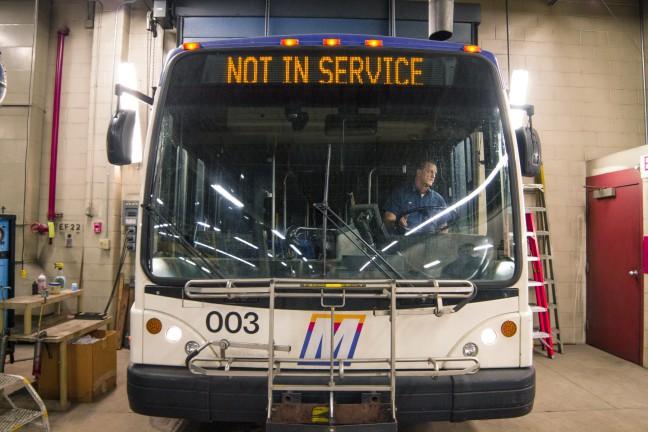Madison’s ongoing Bus Rapid Transit program, or BRT, has not been without controversy.
Intended to provide more efficient services for a growing population, plans for a BRT system were approved for federal funding in Aug. 2020 through the Small Starts Program.
BRT programs are being implemented in cities across the country to accommodate increasing transportation needs while preserving community and economic interests. Designed with more frequent service, shorter transit times and higher capacity limits, a well-executed BRT system has the potential to significantly improve Madison’s public transit.
On the other hand, implementing a BRT system can bring challenges to a city like Madison. Reasonably so, concerns have arisen as the community reckons with the integration of a new system into a unique set of geographic and cultural circumstances.
On Jan. 5, 2021, a locally preferred alternative route was approved for the BRT project. This route is about 15 miles long, running from East Washington Avenue, through the University of Wisconsin campus and continuing to West Towne. Controversially, on the way out of downtown, the buses will travel down State Street.
According to the Metro website, bus routes on State Street will help connect the city of Madison to the businesses, increase consumer traffic and boost the local economy. They argue the efficient nature of the BRT system will prevent congestion that could harm businesses.
But some State Street business owners and other members of the community see it differently.
Out of concern for the impact on local businesses and culture, community members created the organization No BRT on State Street in opposition to the proposed BRT route. The group draws attention to concerns of business owners, such as how larger buses and shelters might disrupt customer flow. No BRT on State Street also highlights community members with worries the system will change the pedestrian-oriented atmosphere, especially because of its proximity to the UW campus.
Other concerns about the plan focus on whether the implementation of the BRT system will be equitable.
The current plan, which is federally funded, has an East-West route. For now, there will be no North-South extension of the system. This means that community members who depend on public transportation in the North and South areas of the city will not see the benefits of BRT for the foreseeable future.
Furthermore, the revised bus routes may result in route changes that limit access for some riders.
Clearly, there is a discrepancy between actual community priorities and perceived interests the city is using to justify its decisions about the BRT system.
Even more frustrating was the failure to pass an amendment to the project, proposed by City Alderpersons Mike Verveer and Syed Abbas. Originally asking for a complete halt in BRT funding, the updated amendment simply asked that an alternative to the State Street route be considered.
New Capital Times website offers path forward for local journalism
The amendment failed by just one vote, so the project will proceed as is, meaning two bus stations staged on lengthy concrete platforms will be built on upper portion of State Street.
Though the community has reservations about the implementation of the existing East-West BRT route, Mayor Satya Rhodes-Conway maintains the system in its current form should be implemented as soon as possible.
In fact, she even described efforts to reconsider the controversial plans as a “clumsy attempt to halt the project” in a Nov. 5 press release. She insisted the implementation of the BRT system would be in Madison’s best interests. But Rhodes-Conway is misattributing community frustration to the concept of BRT itself.
No BRT on State Street explicitly claims that all of its members support BRT. While they don’t want the route running down State Street, they appear to believe the system as a whole could be an effective way to accommodate growing transportation needs in the city of Madison. This perspective is supported by the success of BRT systems in other cities across the nation.
Many businesses, individuals and community members agree Madison has a lot to gain from the implementation of a BRT system, such as faster transit times, expanded access and economic growth. The fundamental disagreements about BRT in Madison seem to relate to implementation rather than the concept itself.
But in this case, implementation is a crucial part of the process. Madison has some unique characteristics, such as being located on an isthmus, home to a major university and the tourist attraction of being the state’s capital. These circumstances should give government officials reason to take their time to create a BRT system that will be just right for Madison.
Part of the problem lies in the fact the project comes from federal funding. The city has to strike a balance between meeting the criteria of the federal grant and keeping in touch with local needs.
Letter to the Editor: Wisconsin’s redistricting process needs to change
The benefits of BRT are difficult to ignore, but such a radical change to a city’s transportation system should be carefully curated around community input, rather than adapting to fit the requirements of distant, federal standards — even if it means risking funding. Federal funding becomes problematic when local officials lose touch with their constituents.
As the project moves forward, people should be concerned about how Mayor Rhodes-Conway and other officials are handling public backlash to the route proposal. If government officials expect public support for projects that will fundamentally change the city’s infrastructure, their efforts should focus on centering community priorities.
The city must decide if they are willing to risk the successful implementation of the project because of a resentful constituency.
Celia Hiorns ([email protected]) is a freshman studying political science and journalism.




















